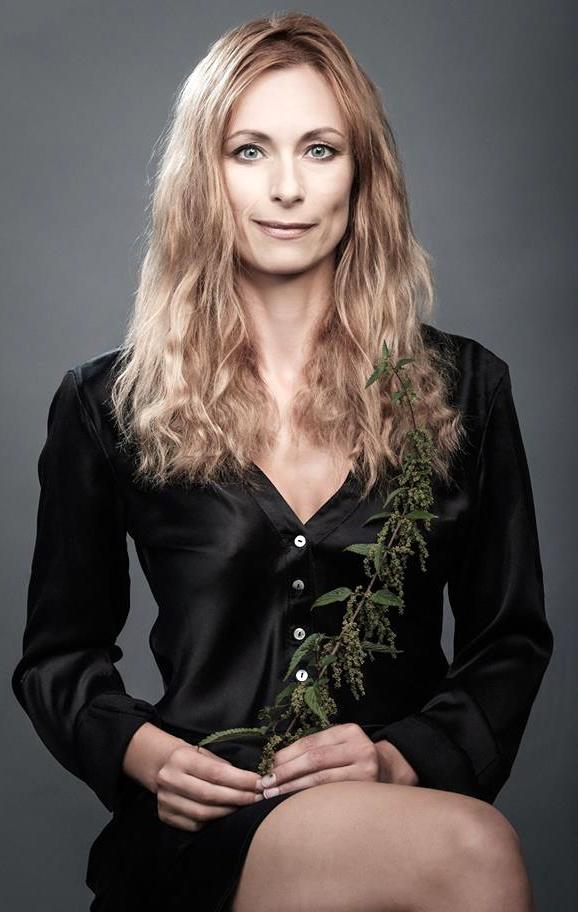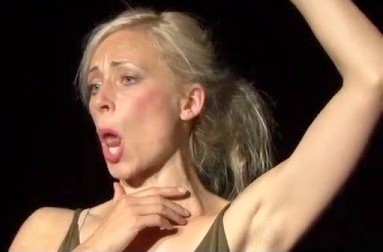SARAH MARIA SUN: SOPRANO SPECIALIST IN THE CONTEMPORARY SONG WORLD
 You were born in a traditional German rich choral and Lieder culture. What made you as a lyric decide to go bipolar and become a specialist in contemporary repertoire apart from incidentally devoting yourself to lesser known ‘old’ material?
You were born in a traditional German rich choral and Lieder culture. What made you as a lyric decide to go bipolar and become a specialist in contemporary repertoire apart from incidentally devoting yourself to lesser known ‘old’ material?
I love acoustical music. Old and new. Pieces by Schumann or Mahler pull the rug out from under me like anybody else. But the music from Berg onwards, especially music from our time, gives me a sensual feeling of excitement. It is contradictory, serene, brutal, violent, tender, noisy and as many-voiced as the sounds and songs on this planet. I’m ‘into’ this because my guts decide for me. It’s a matter of erotic attraction to it, I guess.
Do you love the untouched and want feel it as a mission to make it better known?
Discovering the sensual and psychological or intellectual aspects of a piece is something I really like to do. And when I am thrilled about something, I want to share it with other people: look what I found! Isn’t it brilliant? Is’t it beautiful? And disturbing? Also, it’s a cathartic process, of course. So many silly things are happening in this world, caused by silly people (including myself). Unbearable. Expressing that through music doen’t make it better, but i’s definitely a momentary relief.
You said that you have a preference for seldom performed works ‘because they are difficult and intellectually challenging like the paintings of Sigmar Polk and Joseph Beuys’. Explain yourself, please.
I didn’t say that. I said that my new album ‘modern lied’ with masterpieces by Lachenmannm, Sciarino and many more living composer-masterminds is not an easy-listening disc. Those pieces are auditory modern art. If you look at a sculpture or a painting by Beuys, Kippenberger or Polke, you probably would not use the terms “Oh, this is “BEAUTIFUL”, or “I want to look at this every day in my living room”. Nor were the sculptures meant to be for this purpose.
The fun is to play associative games in your own mind while digesting it. Finding out what structures are quoted, ridiculed, used for new purposes. Finding out in which way the music (or the sculpture) gets under your skin because it triggers emotions or thoughts. Enjoying the jokes inn it; loving a special beauty of it. This way, you are not a numb consumer but an active part of the art piece. Got Lost by Lachenmann does not tell you how you should feel (something I find disgusting in Wagner’s music, for instance). If you are ready to go for it, it will make you listen more and more attentively and your mind will put the pieces of the puzzle together so that you will create a unique tableau of associations, ideas and emotions in your own brain and heart and guts.
What makes them so beautiful in your ears?
I find harmony boring after a while. Conflict, friction, grotesqueness, surprises, enigmas stimulate me and give me a feeling of pleasure and awareness.
How do you get in contact with talent-filled new composers?
 I don’t post ‘wanted-ad’ on Facebook.Sometimes I am simply lucky that a producer brings us together - or that those talent-filled youngsters ask me. Even luckier if I can find new commissions for them. Working with Christine Fischer and the Neue Vocalsolisten Stuttgart was, of course, an immense opportunity to learn to know an immense range of composers and their works.
I don’t post ‘wanted-ad’ on Facebook.Sometimes I am simply lucky that a producer brings us together - or that those talent-filled youngsters ask me. Even luckier if I can find new commissions for them. Working with Christine Fischer and the Neue Vocalsolisten Stuttgart was, of course, an immense opportunity to learn to know an immense range of composers and their works.
Is it difficult to find firms in the music industry to make recordings that are doomed to have no big sales?
Of course it is. Nowadays you have to pay for the CD’s to be produced. Didn’t you know that? Yes, Spotify, YouTune and Amazon are killing the music industry. You’ll see that with Netflix and the film industry; something similar will happen. Spotify is worse because they don’t produce music of all kind themselves, while Netflix does put its money into all kinds of filmmaking. Producing a CD of any kind is becoming hard or impossible for labels. You have to put in your personal money. Or your agent’s money, Or a a sponsor’s Or funding.
We, the musicians, should do something about the streaming. It’s killing us. Labels like Mode record, Testklang, or Avi, Wergo, Kairos and so on: they are heroes. As are the artists, scraping their pennies to make it happen.
So it’s a matter of their being Maecenas, having a mission or prestige?
All of it tother, I guess. As it is for us, the artists.
In your rich discography I find recordings of works by Sora, Sánchez-Verdú, Schnebel, Wasser, Ferrari, Puzo Saunders, Zorn, Bianchi, Aperghis, Kessler, Gedizigglioglu, Hirsch. Most of them are unknown to even people that are interested in music of today. Do any of them offer a special gem?
Anybody who is interested in contemporary music knows Aperghis or Rebecca Saunders and many more of them. But sure, there are lots of gems. It is impossible to separate and discriminate. A mother even loves her ugliest child. But, of course, I’m crazily in love with my newest album Modern Lied (Mode records MOD CD 297) with the incredible Jan Philip Schulze doing the impossible: being a virtuous, brilliant pianist AND a superb accompanist at the samen time, PLUS being witty and intelligent in his interpretations.
And More nonsense (AVI 8553370, reviewed on this site), the wonderful Seiber project by clarinetist Kilian Herold is absolutly worth listing to! Kilian is not only a great musician (and person), but he created a chamber music event of the highest class. If you don’t know Seiber’s music so far (as I didn’t before this project): you’re definitely missing out on something!
Overlooking the whole field, where do you think the best, most inspirational songs are coming from?
From a felicitous mixture of intelligence, instinct, knowledge, curiosity, obsession, empathy, discipline and humour.
From 2007-2014 you were first soprano with Stuttgart’s Neue Vocalisten. Was it there that your interest in a modern repertoire?
No, that happened much earlier, when I as a student in Cologne.Ee had a great professor teaching us about songs from Weill, Bernstein, Eisler and others.He did Bernstein’s Mass with us.Later on I could sing music by Ligeti, which transfixed me.
The period with Neue Vocalsolisten was nevertheless hugely important because my colleagues taught me so much about techniques, ways to listen, ways to think about music - and then the repertoire…| Hundreds of pieces! It was another, unknown universe uncoiling in front of me. Although it was tough fulfilling a solo-career as well as the ensemble schedule (I tried hard to expand the length of the day to 24+, but failed) and I loved it. After seven years my body got too tired and I had to make a decision. I decided to go for the insecure and open path, to be able to expand more, meet other colleagues, undergo new influences.
The first year after we parted was hard. I had eleven stage accidents, only because I was exhausted and missed them so much.
I reviewed your C.P.E. Bach ‘Die Israeliten in der Wüste’ and Seiber CD’s, illustrating the broad span of your repertoire.
I am very happy happy about the Israeliten. When I was a little guitarist (from my fifth till my seventh), my favorite composer was J.S. Bach. When I started singing it were Bach and Haydn.
Singing C.P.E. Bach was like coming back to my roots. I love those ornaments and lines he created. Ah, feels so good in the throat…..
You also sang material of John Dowland, to go further back in music history. Under the titel Shadows it was not in pure Renaissance style, but in arrangements for voice, saxophone, drums, guitar, bells and baroque cello. How were you motivated to undertake this? Giving sad, melancholy old Dowland a new face?
Dowland isn’t particularly sad for me. I feel more a kind shiny, straight honesty in his lines and harmonies. Those lovey-dovey motives of texts get on my nerves - but people of all times have been obsessed by describing their petty love problems. Look at the jazz- or pop music of the past sixty years. So boring. The texts I mean (sometimes also the music).
First I played Dowland in concerts and competitions on the guitar when I was a child. Later I started singing his songs. I remember that many people told me I should build my career on doing both at the same time. But I never found that attractive somehow. When I sing, I need the music to float freely through my arms and hands and express it with my whole body. Having a guitar between me and the audience felt weird.
Recording Shadows was so wonderful because the music had been with me constantly for so many years. The best thing was that Friedemann Wuttke, who initiated the project, wanted it to be experimental. So I wrote down some of the ideas I had and sent them to my colleagues. Luckily, Jochen isn’t only a fabulous improvisor on the sax, but can also play handdrums! And Werner (who usually plays solo cello in famous baroque orchestras) had lots of fun and generously added his beautiful, virtuous playing. We polished it in jam sessions and then toured and recorded it. My favorite moment was when we recorded ‘Fine knacks for ladies’. I ALWAYS had seen this hawker before me who sings it .It’s a rough song by a rugged, old, slightly drunken charmer. She makes anything she wants to sell (even love) joyful and alluring through her charm and boundlessness.
Finally, I could eternalize this version on CD! That made me really happy. )One can watch this recording session om YouTube: //www.youtube.com/watch?v=1gsDNzteT61).
In 2011 you sang in Donaueschingen Hans Thamalla’s: The brightest form of absence. How and why did you come to this?
I had sung the Medea in Hans' music theatre "fremd" at the "Forum für Neues Musiktheater" in Stuttgart in 2006. So we knew each other quite well and I was happy to be asked to sing another premier of his. Hans had become professor for composition at the Northwestern University of Chicago at that time and he had spent some time in the American desert where he recorded and filmed it's sounds. As a result of his adventure the movements with voice were somehow song-like. They had a simplicity, but were enwrapped in wide-spread scales and broadening harmonies. Swaying at the edge of tonality. It was played by my one of my favorite ensembles, the musikFabrik Köln. Working with them is always exciting. On that same evening I was additionally singing some other premiers with Neue Vocalsolisten - a program EXCLUSIVELY by female composers by the way, because Christine Fischer always tried to counterbalance the manly dominated market. I think the balance is getting a bit better in the past 10-20 years. But it's by far not even.
Your new CD Modern Lied will appear in September 2017 with songs that were composed after World War II by Helmut Lachenmann, György Kurtág, Salvatore Sciarrino, Wolfgang Rihm, Heinz Holliger and Bernhard Lang. Tell a bit more about this project.
 Jan Philip and I were eating breakfast in a small town. It was the morning after we ever played together. Performing a program of mixed periods, we had changed styles, languages, piano, toy piano, harpsichord, percussion and between repertoire for mezzo, lyric soprano and coloratura.
Jan Philip and I were eating breakfast in a small town. It was the morning after we ever played together. Performing a program of mixed periods, we had changed styles, languages, piano, toy piano, harpsichord, percussion and between repertoire for mezzo, lyric soprano and coloratura.
We had added electronics or tape, switched between gravitas and comedy, done some choreography on the piano lid and given an encore singing a duet. All in all: we had found out that we liked the same things and enjoyed our time together immensely.
Biting joyfully into his piece of bread, Philip said: “Our next program should be harder. It should be the hardest program ever. We should put some of the greatest contemporary masterpieces of Lied in one program. It should be just insanely beautiful and hard and most of all insanely good. No old stuff included”.
I call it ’The big program’. We are still discovering more extraordinary pieces for it. Over time, it became bigger and bigger, and now includes far more pieces than one CD could hold. But I am proud that we now can share some of the most brilliant Lieder with the rest of the world. In the booklet of this CD you can find interviews with the composers. I wanted them to talk about their way of dealing with voice and piano themselves. Their answers are so much worth reading! They seem to be an aggregation of their generation’s perceptions.
How important was it to find a pianist with a common spirit? Did you find in Jan Philip Schulze the congenial piano accompanist you dreamed of?
Yes. Thank you for this question. For so many years I had envied colleagues who had found a constant accompanist and I had sent my prayers to the universe. Then somebody brought us together in a concert. When we first met, we inly had a coffee and chatted. But I was hit by a feeling which I only had twice so far in my life. Once when I met my husband, and then with Philip: this is it. When I hear him playing next to me on the stage I am so happy that I could cry. It’s beyond words.
If we work together, if we chat, if I visit him and his brilliant wife and kids, if we travel, if we exchange ideas and do planning: it’s always life-enhancing. Enriching. I am so grateful for that.It’s far better than I ever expected a working collaboration could be.
Is there any question you always wanted to be asked, but never got? Then pose it now and give the answer.
I would love to talk about my goal of work-to-donate, about veganism, environmental protection and biological cruelty-free farming, about traveling with a small carbon footprint and why I refuse to drive or use cars (with rare exceptions), about me using cruelty free make-up and dressing in cruelty free clothes, about which charity organizations I support, about feminism,,,,,
All those things which are even more important than contemporary music. This would be an interview much longer than the one above. But probably worth doing/ Would you like to open that bottle…?
Not now, because it falls outside te cadre of this music-website. A next time we perhaps should speak about your role in opera and musictheatre: Sciarrino’s ‘Lohengrin’, Manoury’s ‘Kein Licht’, Srnka’s ‘South Pole’, Schnebel’s ‘Yes I will’, Ruzicka’s ‘Hölderlin’ and others.
There is so much we didn’t talk about: the beginnings of a lyric soprano, the first works on your repertoire, a possible wish to start conducting too like Barbara Hannigan, that other soprano specialist in contemporary music.
Overlooking and summarizing your activities I now understand that chameleon on your hand: a perfect symbol of your versatility.
For more details go to Sarah Maria’s website and all the given links.
Sarah Maria Sun comes tot he Muziekgebouw Amsterdam November 18th 2017 with the Diotima quartet in a.o. Schönbrgs String quartet no. 2 and January 2018 again, that time with the Signum quartet in Jörg Widmann’s Quartet V.
